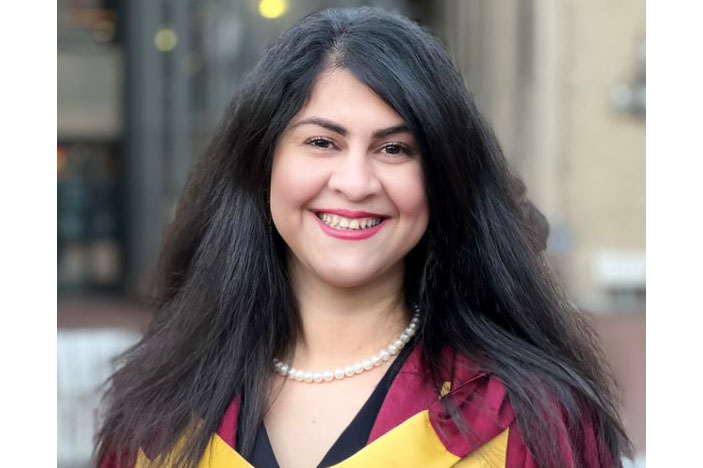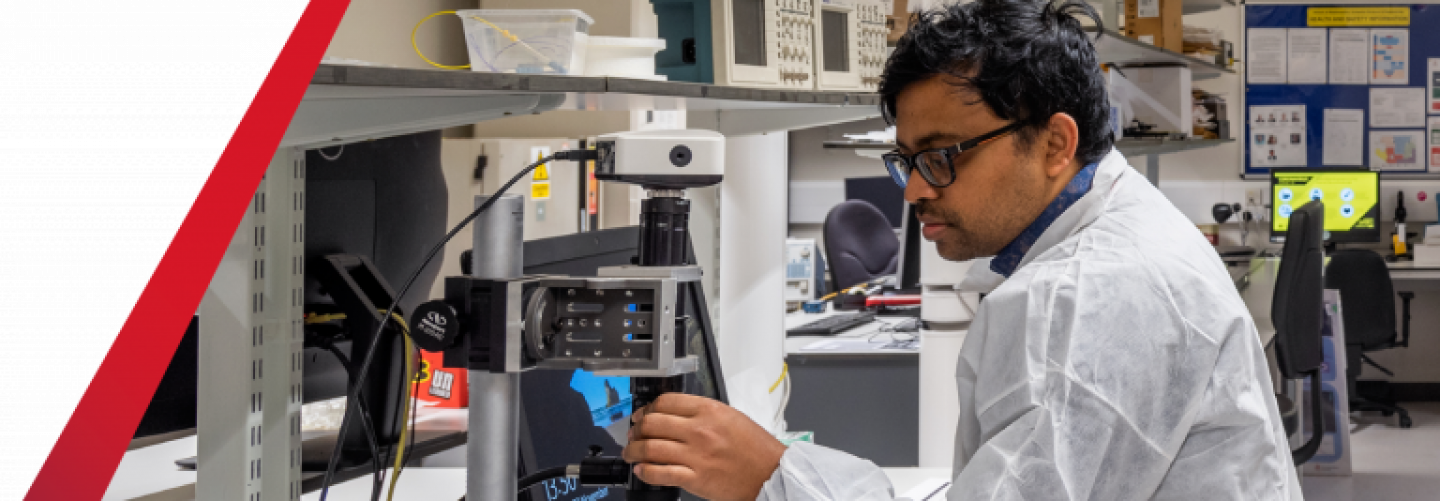She is a senior energy consultant at Arup, an engineering, design and sustainable development consultancy.
By Mr John Stevenson (Senior Communications Officer), Published (Updated )
City, University of London’s School of Science and Technology will honour four of its most outstanding alumni at the second edition of the STEM Alumni Awards on 7th September 2023.
Dr Fatemeh Najibi (PhD in Computer Science, 2021) has been awarded 'Special Recognition' in the 'Excellence in STEM Achievement' category; Jaz Rabadia (BEng Mechanical Engineering, First Class, 2006 and MSc Energy, Environmental Technology and Economics, Distinction, 2009), has received ‘Special Recognition’ in the 'Distinguished STEM Alumni Award' category; Dr Mithileysh Sathiyanarayanan (PhD Computer Science, 2020) has received the ‘Excellence in STEM Achievement Award', while Professor Dame Wendy Hall (MSc Computing, 1986, Honorary Doctorate in Science 2013) is the recipient of the Distinguished STEM Alumni Award.
Fatemeh is a Senior Energy Consultant at Arup applying her multidisciplinary knowledge in AI and Power Systems to assist her in her role.

Her primary focus has been the net-zero emission power network. Fatemeh’s research on advancing knowledge in the intersection of AI for Power Systems has been widely acknowledged by the research community and her expertise and contributions have been also recognized by TechNation in the UK, where she has received endorsement as an Exceptional Talent.
Fatemeh has shared highlights from her times at City and her professional career with City News.
City News: What were your motivations for studying at City?
Fatemeh Najibi: My motivations for studying at City were centered around several key factors. Firstly, City, being one of the best universities in London, offered an exceptional academic environment with a reputation for excellence in research and education. The prospect of learning and conducting research in such a dynamic and intellectually stimulating setting greatly appealed to me. Secondly, the opportunity to work under the guidance of top-tier PhD advisors was a major draw. Their expertise, guidance, and mentorship promised to enrich my research and personal growth significantly. Additionally, the scholarship provided by the university was instrumental in alleviating financial concerns and allowing me to fully immerse myself in my studies without distractions. It demonstrated the university's commitment to supporting talented students and reinforced my belief that City was the perfect place to pursue my academic aspirations. The combination of these factors made City the ideal choice for my PhD journey.
CN: What were the highlights and challenges of your PhD degree programme?
FN: The pandemic presented a significant challenge during my PhD, disrupting the world and affecting my research focus. Despite this, the unwavering support and encouragement from my PhD supervisor, Professor Eduardo Alonso, and advisor, Dr Dimitra Apostolopoulou, were invaluable in helping me persevere through difficult times. On a positive note, the highlight of my PhD journey was the acquisition of a diverse and multidisciplinary skillset. Gaining expertise in AI during my PhD while having a background in Power Systems and Electrical Engineering, before joining the PhD programme, equipped me to approach real-world problems in the net-zero era with a unique perspective. These skills continue to serve me well in tackling complex challenges in the field.
CN: How did your studies at City assist you to transition into your present role at Arup?
FN: My studies at City played a pivotal role in preparing me for my current role at Arup. During my PhD, I focused on the interface of AI and Power Systems, utilizing machine learning techniques to develop a predictive model for solar PV and proposing innovative electricity market designs to support the integration of renewable energy technologies, aligning with the net-zero by 2050 objectives. The recognition and attention my publications received from experts in the field and my endorsement as an exceptional talent by tech nation in the UK further validated my knowledge and expertise. Prior to my PhD, I gained a strong foundation in power system engineering, energy system modeling, smart grids, microgrids, and stochastic mathematics during my master's and undergraduate studies. My Master's work was also published in reputable journals, earning recognition from my peers, and I have been actively contributing to the community as an expert and reviewer since my Master’s. My extensive experience in consultancy and industrial R&D complemented my academic journey, enabling me to contribute effectively to the energy team at Arup, which helps clients such as the UK government and local authorities with their net-zero goals. Drawing from 11 years of combined academic and industrial expertise, I am well-equipped to help Arup in shaping sustainable energy solutions.
CN: Why would you recommend City as a place to study STEM and specifically AI?
FN: I highly recommend City as a premier destination for studying STEM, especially AI. Renowned as one of the top universities in London, City offers a world-class program that fosters personal growth and equips students with the essential knowledge they need to excel. City’s Artificial Intelligence Research Centre (CitAI) stands out with its dynamic and vibrant environment. The MSc program in Data Science showcases the diverse talents of its students, reflecting their stratification and dedication to making real-world contributions. Witnessing my peers securing positions in esteemed companies and actively applying their knowledge to solve practical challenges has been inspiring. As an alumnus, I am proud to be associated with such an outstanding institution. City University boasts an impressive employability rate, emphasizing the practical value of their education and ensuring graduates are well-prepared to embark on successful careers. For aspiring STEM students, City University is undoubtedly a remarkable choice to thrive academically and professionally.
CN: What are the main issues facing the UK in terms of STEM from your perspective as a former student at City and for women in STEM
FN: From my perspective as a former student at City, the UK faces significant issues in STEM, particularly regarding the underrepresentation of women in leadership roles. As women in STEM, we must work together to address this disparity by providing support, empowerment, and the necessary resources for women to succeed and thrive in the workplace. Additionally, combating imposter syndrome is crucial, and we must motivate and encourage young women in practical ways to build their confidence. Furthermore, diversity is a key aspect that demands attention. The industry should foster a more inclusive culture and increase visibility for underrepresented ethnic groups. Embracing diversity will lead to fresh perspectives, innovation, and a more equitable STEM community in the UK.
